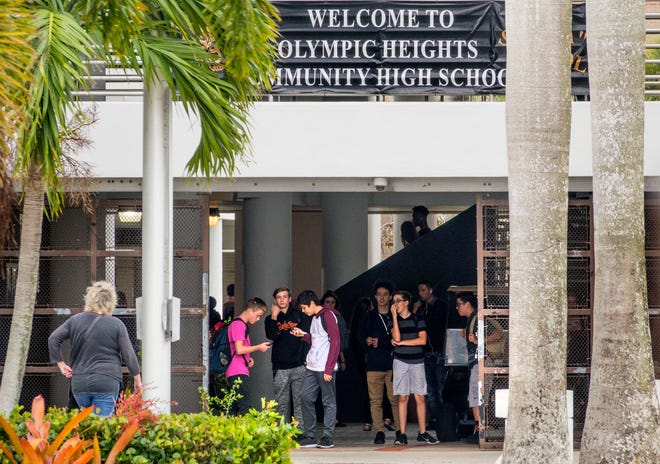Battle emerges at Olympic Heights High over new ‘social and emotional’ classes
Palm Beach Post | By Andrew Marra | June 28, 2021
Palm Beach County public school leaders have long pushed for a greater focus on students’ social and emotional well-being on campus, an effort that only increased after the Parkland school shooting and coronavirus pandemic.
But as administrators move to enhance the role of so-called “social and emotional learning,” they are facing pushback from teachers worried about the introduction of sensitive and complex topics into the classroom and what they call a distraction from academics.
A standoff over the issue is playing out this year at Olympic Heights High School, where administrators have decided to redraw class schedules to build in 15 minutes a day for what they call “Pride Time.”
Starting in August, all classroom teachers will be required to spend a portion of their second class of the day on what the school district describes as free-ranging discussions and relationship-building exercises.
The goal, district administrators say, is for students to learn better how to express feelings, think critically and resolve conflicts, and to develop a better relationship with at least one teacher.
The need is especially great, administrators argue, as tens of thousands of students prepare to resume in-person classes for the first time in nearly 1½ years, some with emotional baggage and worsening learning struggles from the pandemic.
“The overarching goal is to build a sense of community, climate and culture,” said Kristen Rulison, the school district’s social and emotional learning manager. “I’m so excited about this in high school because our students have so many teachers, it’s important that at every school students feel they have at least one trusted adult they can go to.”
The focus on students’ emotional and mental health is not new. Several schools across the county have been working to incorporate social and emotional learning into the school day, oftentimes by having teachers begin a class period with questions intended to spark conversations.
But Olympic Heights High is taking a more aggressive tack by making the sessions a formal part of the school day next year. The efforts to shoehorn social and emotional learning into class schedules has created months of tension on the Boca Raton-area campus.
The school’s principal, Kelly Mills Burke, declined to comment for this story, but the county teachers union said she began pushing in the spring to carve out a dedicated half-hour block for social and emotional learning time.
Many teachers worried that diverting so much class time away from academics would impact their students’ learning progress, and that the sorts of topics they would be required to discuss would cause problems on campus.
In a slideshow presentation to staff, school administrators said they would structure the sessions around a curriculum produced by an organization called CASEL, or the Collaborative for Academic, Social and Emotional Learning.
The curriculum calls on teachers to engage students in discussions about, among other things, racial and gender stereotypes and cultural differences, according to a district learning guide describing the program.
One suggested activity mentioned in the guide is to “think about how assumptions and stereotypes about gender identity, age, culture, race and sexual orientation can prevent us from identifying shared interests and learning from differences.”
Another calls upon participants to “reflect upon how your identity (race, culture, gender identity, sexual orientation, etc.) impacts your perspective.”
Two Olympic Heights teachers told The Palm Beach Post that they and many colleagues feared having to host conversations about such potentially volatile topics, pointing out that just one misinterpreted remark or out-of-context comment could provoke controversy.
“All teachers have to be very careful these days of what they say in the classroom,” said one teacher, who requested anonymity to speak frankly about school operations. “That’s the biggest fear for most teachers. We’re not trained for this. We’re not trained to be therapists or psychologists.”
The teachers union moved to stop the new class sessions, arguing that rewriting the school’s bell schedules to create an additional period constituted a schedule change and would require supplemental pay.
Under the union’s contract, union officials argued, a schedule change would have to be approved by faculty.
District officials insisted they did not need teachers’ permission to make the schedule change, but they pared back the proposal from half-hour to 15-minute sessions.
The union says it nonetheless plans to mount a legal challenge to the new program once the school year begins in August.
Union President Justin Katz said teachers are not opposed to the discussion of weighty topics such as race and gender in the classroom, but he said it was irresponsible for administrators to require teachers who had no training or expertise in teaching the subjects to do so.
“We’re at a point in time that a teacher says anything that a parent doesn’t personally agree with, they call the school and demand that they be fired,” Katz said. “It could be something absolutely germane and parents flip out. So how is an algebra teacher going to defend themselves when they had a discussion about gender identity and sexuality in algebra class?”
Rulison acknowledged topics like race and gender could arise in the new discussions, but she pointed out the same held true for many subjects taught every day in classrooms.
She said that teachers who feel uncomfortable with a turn in a conversation can end the dialogue or ask for assistance from a guidance counselor.
“If teachers aren’t comfortable, nothing is required,” she said. “We want teachers to feel comfortable with what they’re doing. We don’t want anyone to feel uncomfortable.”
At Olympic Heights, though, teachers doubted the practicality of those assurances. They said conflicting messages from administrators have only increased their doubts.
Two teachers said, for instance, they initially were told their “Pride Time” sessions would follow the CASEL curriculum, then that no curriculum would be used.
Then, weeks later, a message came from an assistant principal to a group of teachers asking for volunteers in creating an entirely new curriculum.
The school has given few details about what is expected to be taught, they said, and no training so far.
Before classes resume Aug. 10, a single day of training has been set aside, Katz said.
“We still don’t know what the topics are going to be, we still don’t know what the curriculum is going to be,” said a second teacher, who also asked to remain anonymous. “How comfortable would you feel? We still don’t know what we’re doing.”






